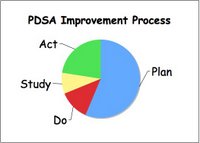Please update your bookmark to the new Induction Connection location:
http://inductionconnections.blogspot.com/
Induction: All social processes associated with ensuring that members are aware of and embrace the norms and values of the group or organization and that they possess the skills, attitudes and habits of mind necessary to fulfill the roles they are assigned in the group or organization.
A system is a group of interacting, interrelated, and interdependent components that form a complex and unified whole. As you read the definition what connections do you make to your role of developing teachers?
"Systems thinking is a perspective because it helps us see the events and patterns in our lives in a new light—and respond to them in higher leverage ways. For example, suppose a fire breaks out in your town. This is an event. If you respond to it simply by putting the fire out, you're reacting. (That is, you have done nothing to prevent new fires.)
If you respond by putting out the fire and studying where fires tend to break out in your town, you'd be paying attention to patterns. For example, you might notice that certain neighborhoods seem to suffer more fires than others. If you locate more fire stations in those areas, you're adapting. (You still haven't done anything to prevent new fires.)
Now suppose you look for the systems—such as smoke-detector distribution and building materials used—that influence the patterns of neighborhood-fire outbreaks. If you build new fire-alarm systems and establish fire and safety codes, you're creating change. Finally, you're doing something to prevent new fires!"
Source: About Systems Thinking. (n.d.). Retrieved January 14, 2009, from http://www.pegasuscom.com/aboutst.html.

 Although quite similar in the role of support, the selection process for mentoring is different from coaching. In terms of selection, Coaches are usually assigned to the less experienced and Mentees select their Mentors. Recommendations, influence, knowledge, skills and even personality all take part in the selection process.
Although quite similar in the role of support, the selection process for mentoring is different from coaching. In terms of selection, Coaches are usually assigned to the less experienced and Mentees select their Mentors. Recommendations, influence, knowledge, skills and even personality all take part in the selection process. I perceived the Plan, Do, Study, Act process as four equal parts…until today. Planning is a major part of the Continuous Improvement Cycle and is appropriately represented in this graphic with Planning as no less than 50% of the time. Makes sense when W. Edwards Deming preached, "We should work on the process, not the outcome of the processes."
I perceived the Plan, Do, Study, Act process as four equal parts…until today. Planning is a major part of the Continuous Improvement Cycle and is appropriately represented in this graphic with Planning as no less than 50% of the time. Makes sense when W. Edwards Deming preached, "We should work on the process, not the outcome of the processes."